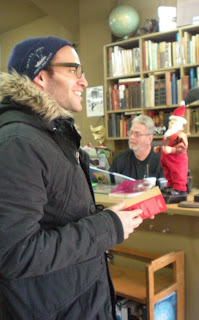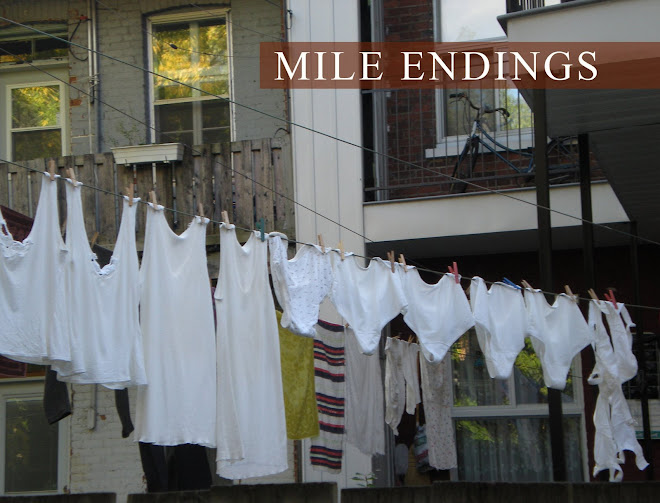
S.W. Welch is the oracle of St. Viateur Street.
Behind his counter stacked with books, he issues pronouncements: "Rebus will be back. I'll tell you that right now," he says of the detective retired by author Ian Rankin. He also declares: "Harry Potter will be back."
Does he know something we don't?
The answer is, yes.
He keeps a luminous crystal ball on his countertop, but he doesn't need that to make his predictions.
On a recent weekday, the phone kept ringing and callers pressed him into instant evaluations. "I find it unlikely that that book would have much value," he tells one.
"It kills me when I tell someone their book is a piece of junk and they don't want to listen. I'm not the God of all bookselling but my opinion is that of one who's been interested in books for 30 years and has a fairly good idea of how much something's worth. It's a gut feeling based on years of experience. Then they'll say, 'is there anyone else I can call?'" S.W. Welch scoffs and shakes his head.
"I possess a certain amount of hubris and ego," he adds, with a smile.

"The general problem with being a used or antiquarian bookseller is that people's books are infused with love and personal interest. Let's say you have a lot of books but you are, unfortunately, deceased. Your daughter calls me to look at the books, thinking, 'This one was on mom's bedside table for years. She loved it, she traveled to Egypt with it!' And then S.W. walks in and says, 'I don't pay for sentiment.' "
Stephen Wesley Welch often refers to himself in the third person, as if to lend distance to his appraisal. At 6 feet 6 inches tall and 340 pounds, his physical presence adds gravitas. "As a young man I was 165 pounds. You turn into a fat guy," he shrugs, blaming his sedentary occupation for his weight. "Once I started gaining weight I got more respect."

A customer who's been wandering around asks to see some art books from the window display. (Another S.W. decree: "Booksellers live by their windows.")
"We enjoyed our meal last night, Leo," S.W. tells him, after retrieving the books. "Next time, just maybe not so much oil on the octopus." The bookseller and Leo the restauranteur, trade goods for services, books for meals.
"You know how to be a millionaire as a bookseller?" Leo jokes. "Start with two million."
S.W. counters, "You want to run a small bookstore? Start with a large bookstore."
That's what he did. The old S.W. Welch store on the Main was wider and deeper, with more room for books. But the Mile End space seems warmer. Three years after the move it feels like Welch's has been here forever, along with a permanent bunch of quiet browsers and a couch potato or two on the soft old sofa.
Someone comes in looking for Yann Martel's "Life of Pee." A student in search of The Magic Mountain finds it on a table. Someone else inquires about a particular Asimov and someone else asks for Kitchen Confidential from the window. Shoppers pay for paperbacks of Carl Hiaasen and Saul Bellow and a hardcover edition of George Steiner.

S.W. gets up to get books from the display, sits back down in the small space behind the counter and brews an espresso using the tiny machine wedged in at his elbow.
The countertop is littered with the tools of his trade: a box of wipes, a mug of pencils, utility knives and brushes; a bottle of Elmer's glue.
The squeaky door admits a collection of regulars, including a boozy smelling guy who wants to sell CDs someone was probably throwing out. S.W. buys 20, saying, "I hope that's pure profit for you," even though he doesn't sell CDs in the store.
"He's one step away from being homeless," says S.W. who likes to support people who exist outside of the traditional economy, such as the pickers who comb garage sales and church bazaars for books to bring him.
Every customer through the door comments on S.W.'s recent short haircut and beard trim. As a large white-whiskered man, he claims he sought it to avoid seasonal comparisons to Santa.
"I enjoy meeting people. But I'm actually quite shy," S.W. says.

Beany Peterson, S.W.'s wife of 35 years, confirms this revelation. "Stephen is shy to the point of..." she pauses as she searches for the right word. "He won't go to a party. He hates social functions."
She explains that the only way she got S.W. to agree to a party for her 50th birthday was to let him be the bartender. "If he can sit behind a counter with something to do, where people can come up to him, he'll have fun."
Behind counter at the store, S.W. says, "I'm in my comfort zone here. I'm in control."
 In his zone he chats amiably about Beany, a librarian at the Montreal Neurological Institute and a partner in the store; about their sons, Andrew and Patrick; about his family's house in New Brunswick; his grandfather's sardine cannery; his preferred grocery stores and restaurants; how he's lost 80 pounds in the past year; what he's making for dinner (mussels tonight, slow roasted pork for tomorrow); fat-free Greek-style yogurt; photos he's taken lately; his camera; and, of course, books.
In his zone he chats amiably about Beany, a librarian at the Montreal Neurological Institute and a partner in the store; about their sons, Andrew and Patrick; about his family's house in New Brunswick; his grandfather's sardine cannery; his preferred grocery stores and restaurants; how he's lost 80 pounds in the past year; what he's making for dinner (mussels tonight, slow roasted pork for tomorrow); fat-free Greek-style yogurt; photos he's taken lately; his camera; and, of course, books. "I'm interested in every little tiny detail of every book," he says, pulling out a recently acquired, century-old paperback called: Kenya: Britain's Youngest and Most Attractive Colony. "This is just a goldmine of interesting stuff."
Yet, when someone comes in with a stack of books to sell, S.W. goes silent. All expression drains from his face. There are certain tricks to this trade.
"There's plenty of bluffing," he concedes. "The first thing about buying books is to show no interest whatsoever. The books are just widgets you're selling to widget buyers."
Of course this isn't true. It's the paradox of the whole enterprise. As S.W. himself knows, people invest books with feeling. Sometimes books may be the only thing that makes life interesting.
One time, S.W. went to the small basement apartment of a man who'd worked in the laundry room of the Queen Elizabeth Hotel. He'd died and his mom was selling his books.
"This guy had everything," recounts S.W. "A complete set of Jung, Freud, Shakespeare. Everything. Every wall was shelved. He never cooked. He had a dictionary stand in the kitchen where he read his dictionaries. I told his mother I didn't have much money, that it wasn't enough, but I could give her $5,000 for it all."

At the store, a client pulls Dorothy Parker, ee cummings and Langston Hughes out of a knapsack. "Twelve dollars for these," is the verdict from behind the counter.
The shelves are packed, there are loaded carts of books and boxes on the floor, but the stock keeps coming in. "I'm not complaining," says S.W. "I'd spend my last penny on books."



